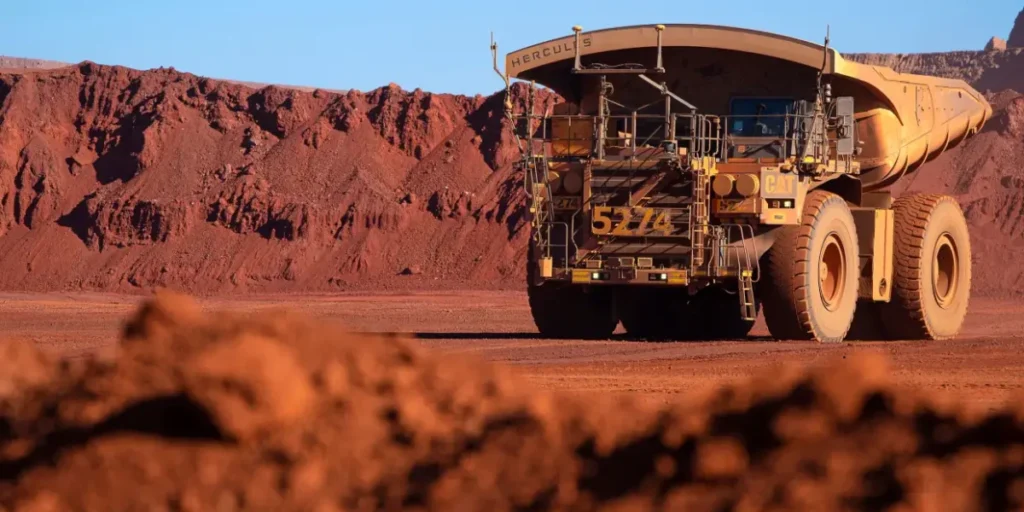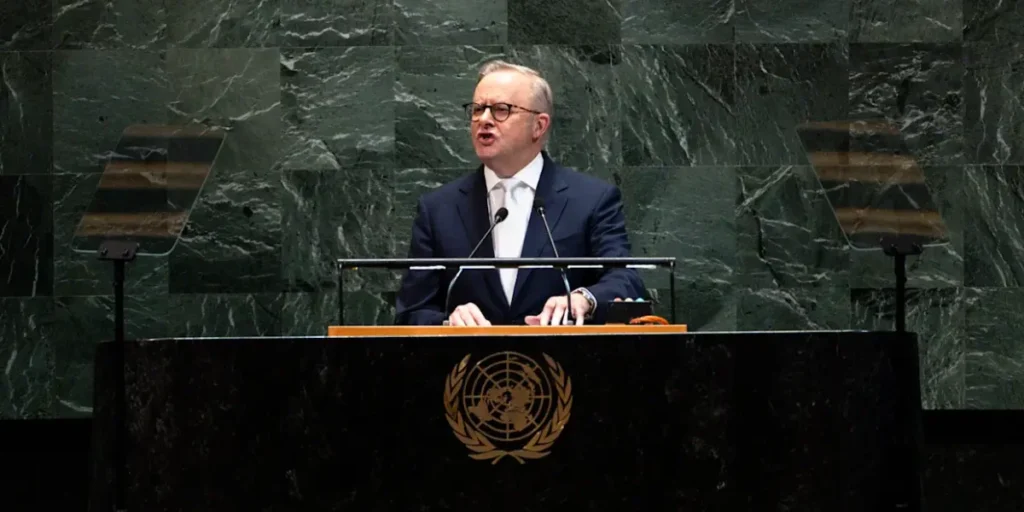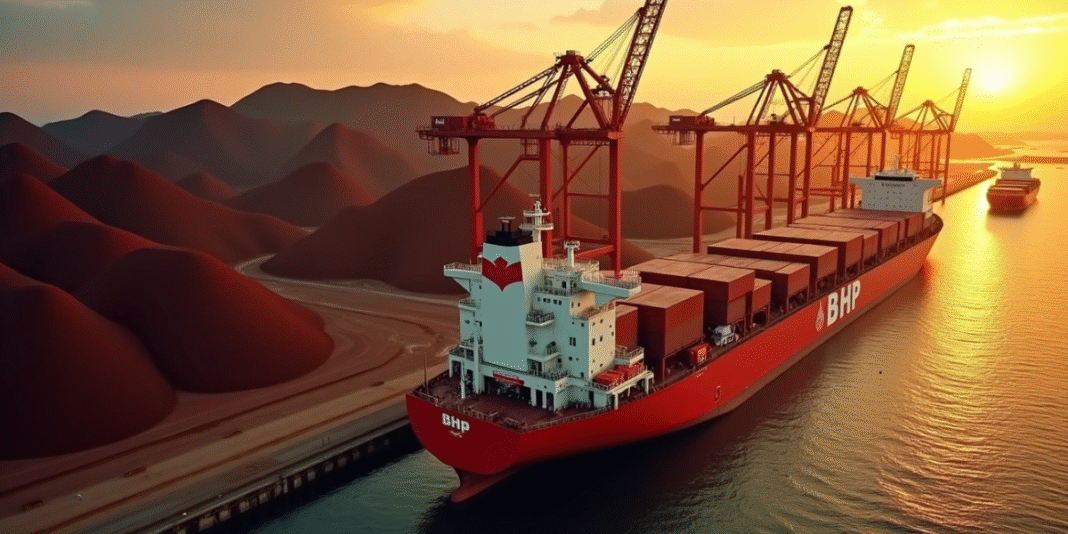China bans BHP iron ore imports amid an escalating pricing dispute between the world’s largest iron ore consumer and the global mining giant. China, which buys approximately 75 per cent of global seaborne iron ore, has instructed major steelmakers and traders to temporarily pause purchases of any dollar-denominated seaborne iron ore cargoes from BHP.
This significant trade disruption affects one of the three key suppliers to Chinese steelmakers. BHP, the world’s largest listed miner, recently reported underlying profits of US $10.2 billion (£15.7 billion), representing a steep decline of 26% compared to the previous year. Consequently, BHP shares dropped slightly by 1.1 per cent to $42.05 at the opening of trade on the Australian Securities Exchange. The halt in trading comes at a challenging time for BHP, whose revenues already decreased to US$51.3 billion (£79 billion), an 8 per cent reduction from 2024.
China Halts BHP Iron Ore Imports Amid Pricing Dispute

China’s state iron ore buyer has instructed major steelmakers and traders to temporarily stop purchasing all dollar-denominated seaborne iron ore cargoes from BHP, according to Bloomberg News. This directive extends beyond new contracts to include cargoes already en route from Australia.
The conflict stems from unsuccessful pricing negotiations between BHP and China Mineral Resources Group (CMRG). The state-owned entity, established in 2022 to bolster Beijing’s pricing power in global iron ore markets, has been unable to reach an agreement with the mining giant. At the core of the dispute are discounts applied to BHP’s medium-grade ore.
Earlier this month, CMRG had already urged Chinese steel mills to suspend purchases of BHP’s Jimblebar blend fines after contract talks faltered. The latest direction represents a significant expansion of these initial restrictions.
However, conflicting information has emerged. Chinese commodity analysis firm Mysteel has contradicted Bloomberg’s report, stating that CMRG had issued no such directive.
Despite the uncertainty, BHP declined to comment directly on the negotiations but stated that shipments from Western Australia’s Port Hedland remain uninterrupted. Meanwhile, market analysts suggest this apparent ban is primarily a negotiating tactic, noting that “China cannot realistically walk away from BHP supply altogether”.
Australian Leaders Respond to Trade Disruption

Australian Prime Minister Anthony Albanese has expressed concern over China’s reported ban on BHP iron ore imports, calling for a swift resolution to the trade disruption.
“I am concerned about that and what we want to make sure is that markets operate properly,” Albanese told reporters. “I want to see Australian iron ore to be able to be exported to China without hindrance. That is important, it makes a major contribution to China’s economy but also to Australia’s.”
Albanese suggested the ban might be a negotiating tactic, noting, “Sometimes when people are negotiating over price, sometimes these things will occur”. He described the measures as “disappointing” whilst expressing hope they would be “very much short-term”.
Treasurer Jim Chalmers has arranged to meet with BHP Chief Executive Mike Henry to discuss the issue. “I’ll have discussions with Mike Henry about that in due course, when we can set that up,” Chalmers stated.
Furthermore, Western Australia Premier Roger Cook characterised the situation as “gamesmanship” in “tough” negotiations rather than an actual ban. “I had a briefing from [BHP iron ore chief] Tim Day earlier this week… he’s saying the negotiations are tough and are subject to a certain amount of strategic gamesmanship,” Cook explained.
Last year, Australia’s iron ore shipments to China exceeded AUD 152.90 billion, underscoring the economic significance of this trade relationship.
Market Reactions and Strategic Implications Unfold

Financial markets responded cautiously to news that China bans bhp iron ore, with BHP shares initially falling 1.1% to AUD 64.29 on the Australian Securities Exchange. The reaction varied across global exchanges—London-listed shares experienced a sharp 4.7% selloff before recovering to close down 1.9%, while NYSE-listed ADRs followed a similar pattern.
Market analysts generally view the ban as a temporary negotiating tactic. “This is temporary and clearly a negotiating strategy. China just wants to remind them who drives the price,” noted Henry Jennings, senior portfolio manager with Marcus Today. Similarly, RBC Capital Markets suggested the move represents “an effort to secure lower long-term prices”.
The timing appears strategic, as Chinese mills have built up inventories ahead of national holidays. Nevertheless, the standoff highlights significant interdependence—BHP produced 264 million tonnes of iron ore in FY25, with approximately 160 million tonnes destined for China, representing roughly 13% of China’s total imports.
Notably, this tension emerges as the Simandou project in Guinea prepares to enter the market. Once fully operational, Simandou will add 120 million tonnes of annual capacity, potentially reshaping global iron ore trade. For BHP, whose average realised iron ore price fell 19% over the financial year, this represents an additional strategic challenge amid already declining profits.
You May Also Be Interested In: Australia Ghost Sharks China: Defending Against Territorial Claims
Conclusion – China Bans BHP Iron Ore
The escalating trade tensions between China and BHP represent a significant disruption in one of the world’s most crucial commodity relationships. Indeed, the ban on dollar-denominated seaborne iron ore from the mining giant underscores China’s determination to leverage its position as the world’s largest consumer of iron ore. Additionally, this move occurs at a particularly challenging time for BHP, which already faces declining profits and falling iron ore prices.
Market analysts overwhelmingly view this development as a strategic negotiating tactic rather than a permanent trade barrier. Consequently, both Australian political leaders and financial experts have expressed measured concern while emphasising the fundamental interdependence between the two parties. BHP supplies approximately 160 million tonnes of iron ore to China each year, accounting for roughly 13% of China’s total iron ore imports. Therefore, any prolonged disruption would substantially harm both economies.
The timing appears particularly notable given the imminent entry of Guinea’s Simandou project into the global iron ore market. Once fully operational, this project will introduce a significant new supply to global markets, potentially shifting the balance of power in iron ore pricing. Meanwhile, Australian Prime Minister Anthony Albanese’s characterisation of these measures as “disappointing” yet likely “very much short-term” reflects the pragmatic understanding that economic realities ultimately drive trade relationships.
This dispute thus reveals the complex dynamics of global commodity markets, where pricing power, strategic negotiation, and essential interdependence collide. Though BHP shares experienced modest declines following the announcement, the relatively muted market reaction suggests confidence that economic imperatives will eventually prevail over tactical manoeuvres. Regardless of the immediate outcomes, this situation highlights how resource dependencies continue to influence international trade relations in an increasingly complex global economy.
What is the current situation between China and BHP regarding iron ore imports?
China has reportedly instructed major steelmakers and traders to temporarily pause purchases of dollar-denominated seaborne iron ore cargoes from BHP due to a pricing dispute. This move affects one of China’s key suppliers of iron ore.
How has the Australian government responded to this trade disruption?
Australian Prime Minister Anthony Albanese has expressed concern over the reported ban, calling for a swift resolution to the issue. He views it as potentially a short-term negotiating tactic and hopes for a quick return to normal trade relations.
What impact has this situation had on BHP’s stock market performance?
BHP shares experienced a slight dip following the news, with a 1.1% decrease on the Australian Securities Exchange. However, market analysts generally view this as a temporary setback rather than a long-term issue.
How significant is the iron ore trade between Australia and China?
Australia and China exchange a significant amount of iron ore. Last year, Australia’s iron ore shipments to China exceeded AUD 152.90 billion, highlighting the economic importance of this trade relationship for both countries.






